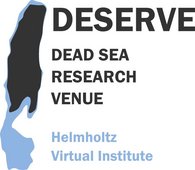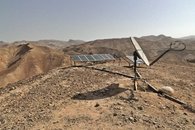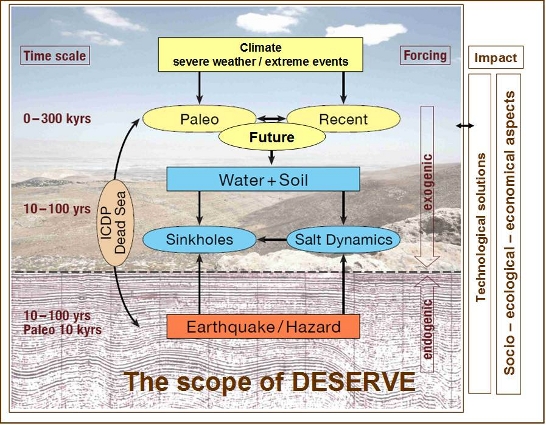This observatory, our most recent addition, is embedded in the Virtual Helmholtz Institute (VI) DESERVE. It explores Earth system processes under the unique conditions of the Dead Sea area in a joint endeavour by the Helmholtz Centres KIT, GFZ and UFZ and their Middle East partners. DESERVE explores an environmentally unique region on Earth addressing three grand challenges: environmental risk, water availability, and climate change by combining long-term monitoring of geophysical parameters (stations are identical to IPOC), studies of coupled processes in the atmosphere, hydrosphere, pedosphere, and lithosphere as well as models for prediction and remediation strategies of geogenic risks.
Time frame - 2012 - 2017
One part of the project is the long-term monitoring of earthquakes via 6 multi-parameter stations in Israel, Palestine and Jordan. The field work for the sink hole study will continue in 2018.
Funding - HGF - Helmholtz Association of German Research Centres, Virtual Institute
Principal Investigators
WP1 - Sinkholes, Their Formation, and Estimation of Vulnerable Areas - Torsten Dahm (GFZ)
WP3 - Monitoring of the Dead Sea Region by Multi-parameter Stations - Michael Weber (GFZ)
WP5 - Earthquake Hazard, and Paleo-reconstructions - Michael Weber (GFZ), Amotz Agnon (Hebrew Univ./IES), Stefano Parolai (OGS)
Personell - Ayman Mohsen (GFZ), Michael Haas (GFZ), Djamil Al-Halbouni (GFZ)
Project Website - www.deserve-vi.ne
Cooperations
Hebrew University Jerusalem, Israel (Amotz Agnon)
An-Najah University, Nablus, Palestine (Jalal Dabeek)
Ministry of Energy and Mineral Resources, Amman, Jordan (Ali Sawarieh)
Methods & Equipment
We study the occurence of sink holes at the Dead Sea, monitor the region of the Dead Sea for earthquakes with mulit-parameter stations, determine earthquake hazard and study paleo-climate and paleo-earthquakes using deep boreholes in the Dead Sea.
Publications/Results
Kottmeier, C., Agnon, A., Al-Halbouni, D., Alpert, P., Corsmeier, U., Dahm, T., Eshel, A., Geyer, S., Haas, M., Holohan, E., Kalthoff, N., Kishcha, P., Krawczyk, C., Lati, J., Laronne, J. B., Lott, F., Mallas, U., Merz, R., Metzger, J., Mohsen, A., Morin, E., Nied, M., Rödiger, T., Salameh, E., Sawarieh, A., Shannak, B., Siebert, C., Weber, M. (2016): New perspectives on interdisciplinary earth science at the Dead Sea: The DESERVE project. - Science of the Total Environment, 544, p. 1045-1058. doi.org/10.1016/j.scitotenv.2015.12.003
Acknowledgment
We thank the GIPP for providing the instruments and our local partners in Israel, Palestine and Jordan for their support.
To solve these challenges the Virtual Institut has been organized into seven Work Packets (WP):
- WP1 - Sinkholes, Their Formation, and Estimation of Vulnerable Areas
- WP2 - Assessing the Dead Sea Water Budget Components
- WP3 -Monitoring of the Dead Sea Region by Multi-parameter Stations
- WP4 - Promotion of Interdisciplinary Education of Young Scientists
- WP5 - Earthquake Hazard, and Paleo-reconstructions
- WP6 - Water Availability in a (Semi-)Arid Region with Water Scarcity
- WP7 - Regional Weather and Climate, Atmospheric Hazards, and Health





